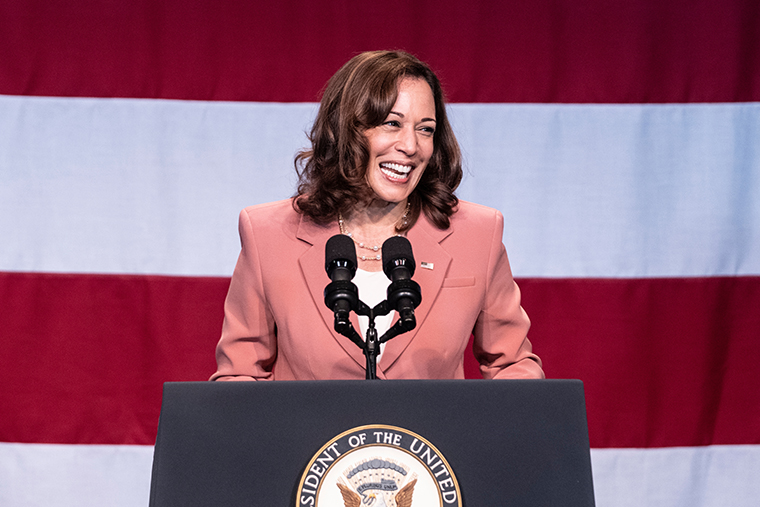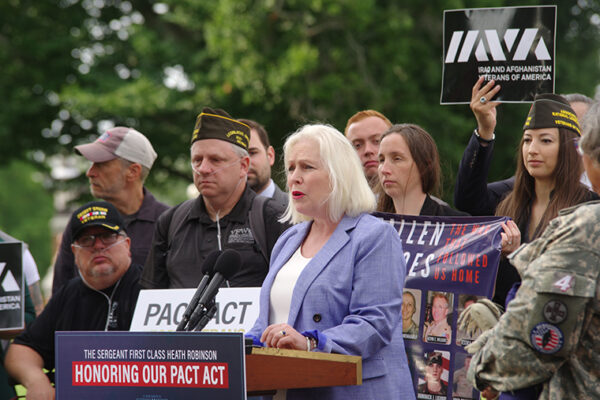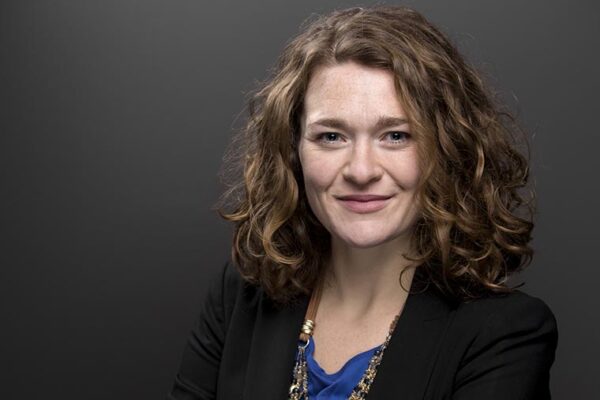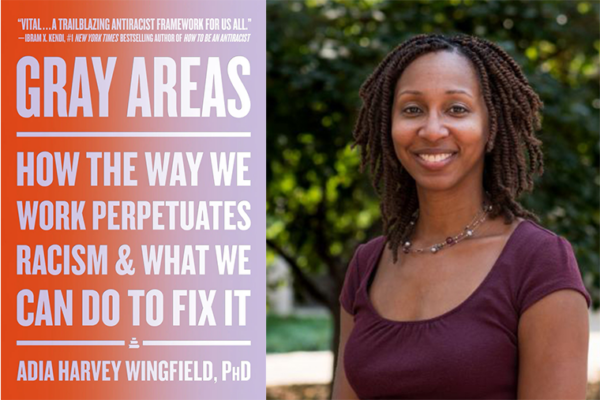On Jan. 20, 2021, Kamala Harris was sworn in as vice president of the United States — the first woman, the first Black American and the first South Asian American to be elected to this position. Four years later, she hopes to make history again by defeating former President Donald Trump to become the country’s 47th president.
In just the first week, Harris’ campaign raised more than $200 million and registered more than 170,000 new volunteers. But among the biggest hurdles that Harris will have to overcome in her quest to win the election is the gender bias that permeates politics.
Below, Diana Z. O’Brien, the Bela Kornitzer Distinguished Professor of Political Science in Arts & Sciences at Washington University in St. Louis and an expert on gender and politics, discusses the unique challenges facing female politicians, the importance of representation in politics and more.
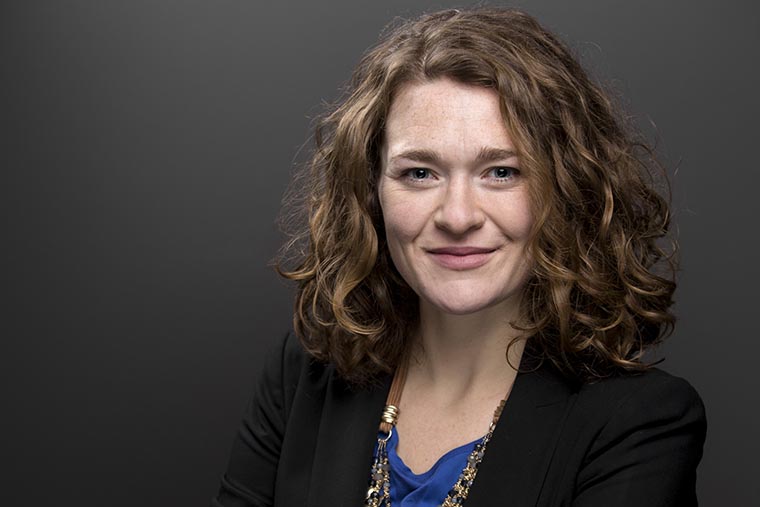
What are some of the unique challenges that women candidates face?
In the United States, women still face some voter bias. According to the most recent World Values Survey, 15% of American respondents agreed that “men make better political leaders than women do.” Political scientists find that while women candidates win at equal rates to men, they often have to be more qualified to do so.
This voter bias is correlated with partisanship. Democratic voters tend to be more favorable toward women candidates and those who exhibit more stereotypically feminine traits. Conversely, Republican voters exhibit higher levels of sexism and penalize candidates with a “feminine” self-presentation, regardless of the candidate’s sex. Additionally, left-wing voters are more likely to support women with progressive ambition (i.e., seeking higher office) than right-wing voters.
However, women across political parties can face “imputed” or “strategic” discrimination. This means that even if voters do not personally object to women’s leadership, they may still opt for male candidates, fearing that women are less likely to win elections. Vice President Kamala Harris is in a unique position because she did not have to compete in a primary, thereby avoiding this particular challenge.
Beyond hostile sexism, what are some of the less obvious ways that sexism can influence how we view candidates?
Voters with overtly sexist beliefs were already unlikely to vote for Biden. However, even voters who are, in principle, supportive of women’s leadership might struggle with this in practice.
When we think about leadership — particularly in the executive branch — we often associate it with masculine traits such as decisiveness and toughness. This makes it difficult for people to envision women in these roles. Women also face the challenge of needing to demonstrate both warmth and competence simultaneously, a balance that is often difficult to achieve. As a result, while voters may support the idea of women leaders in the abstract, they may find it hard to accept any specific woman as fitting the bill.
Swing voters also present unique challenges. In the United States, women are often stereotyped as more left-leaning than men, and Black politicians are stereotyped as more left-leaning than white politicians. These stereotypes persist even when accounting for politicians’ policies. As a result, voters might assume Vice President Kamala Harris is more left-wing than her actual policies.
I also think bias is evident in the nearly universal agreement that her vice presidential nominee should be a white man, suggesting a sense on both the left and the right that the country is not ready for an all-woman or all non-white ticket. Conversely, there is less pushback against an all-male ticket, even within the Democratic Party.
Assuming Harris earns the nomination, as she appears poised to do, how do you think her candidacy will compare to Hillary Clinton’s 2016 campaign?
One advantage Harris has is not having to go through a primary, thereby avoiding the imputed/strategic discrimination addressed above. She was also able to avoid attacking fellow Democrats, which voters might find to be particularly off-putting when done by women. However, because there was no primary, this could lead to criticisms of her qualifications, with some implying she couldn’t have won a primary. But, if we’re being honest, similar arguments were made about Clinton, with opponents suggesting that the Democratic establishment orchestrated her primary victory.
I also see at least two other advantages. First, a set of women on the left became more politically engaged following Trump’s election in 2016. Harris might be able to reinvigorate this group of supporters, particularly because she is contending against Trump. Additionally, “women’s issues” are much more salient in the electorate today. Abortion remains a critical issue for many voters, and issues that disproportionately affect women, such as child care and parental leave, are even more prominent.
What advice would you offer to Harris and her campaign?
Knock on as many doors as possible in Arizona, Georgia, Michigan, Nevada, Pennsylvania and Wisconsin.
Evidence from across the democratic world suggests that voters aren’t universally biased against women leaders. They hold some positive stereotypes about women as well. For example, voters often report that women are more trustworthy, less corrupt, more compassionate and better on issues like education and child care. As much as possible, I would recommend that Harris frame the election around issues on which women are perceived as especially successful.
Finally, scholarship suggests that voters do not like women displaying negative emotions, including during debates. They do not penalize men in the same way. While it might not be fair, Harris has to stay calm, positive and forward-looking.
Why is representation in politics important?
As a gender and politics scholar, my response to this question is that women’s representation in politics is fundamentally a matter of justice and fairness. Women make up the majority of the electorate, and there are more than enough exceptionally well-qualified women to hold political office. As citizens, women should be entitled to equal representation. We would never question the importance of men’s representation in politics.
Additionally, women’s representation can have broader positive effects. It changes citizens’ relationship to politics. For example, my work shows that citizens feel more positive about politics when women are represented in legislatures compared to when they are excluded. This holds true in the U.S. and abroad. Research from other countries suggests that women presidents and prime ministers can increase acceptance of women leaders and boost political interest and voter turnout, especially among women. For instance, during Angela Merkel’s leadership in Germany, women in her party became more politically engaged. A study in Brazil found that imagining a woman governor improved women’s interest in politics and their likelihood to get involved.
There’s also substantial evidence to suggest that democracies with women legislators are more likely to adopt women-friendly policies. This relationship is more nuanced when it comes to women presidents. Research from Latin America indicates that women presidents may be more likely to legislate on behalf of women, but only when they rely on women voters and have feminist women in their networks. I suspect this would apply to Kamala Harris, so we might expect increased attention to policies related to child care and paid parental leave during her administration.
If Harris were to win the general election, how might sexism continue to affect her presidency?
Existing work studying women leaders elsewhere suggests women leaders often face higher standards and harsher evaluations compared to their male counterparts. Studies have shown that women presidents typically have lower approval ratings and shorter honeymoon periods. Their approval ratings are more negatively impacted by issues like security and corruption. Unlike men, women leaders don’t benefit from rallying public support after terrorist attacks. Women don’t just have to work harder to win; they have to work harder to govern, too.
